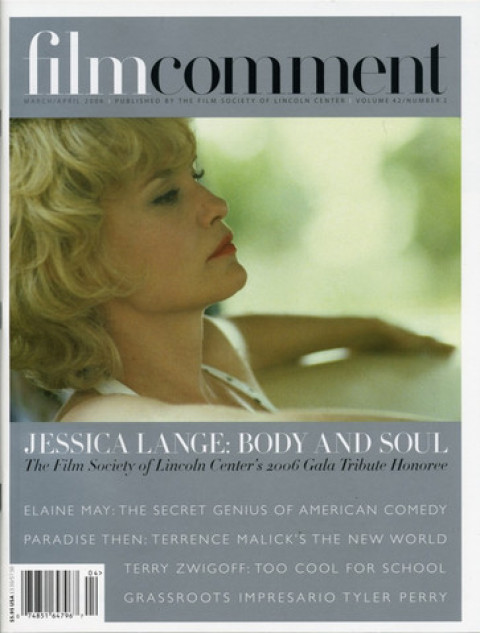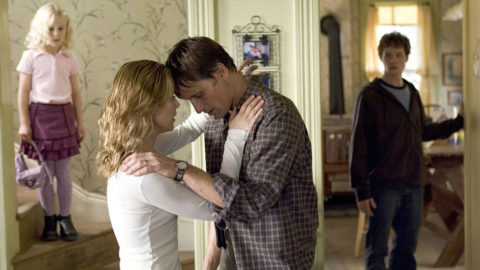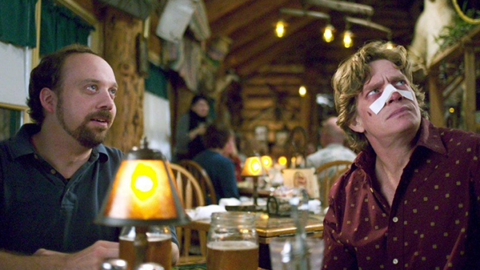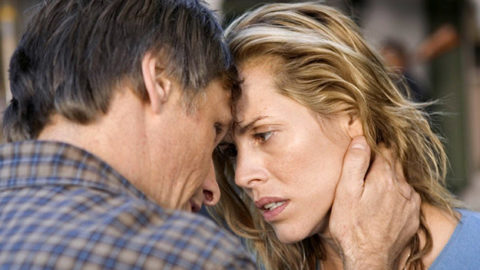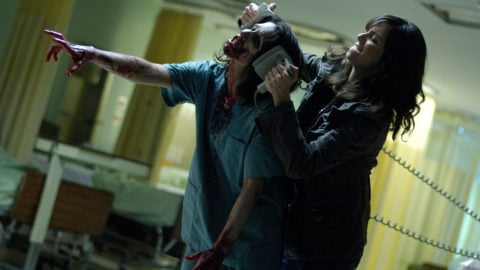BEST OF 2005
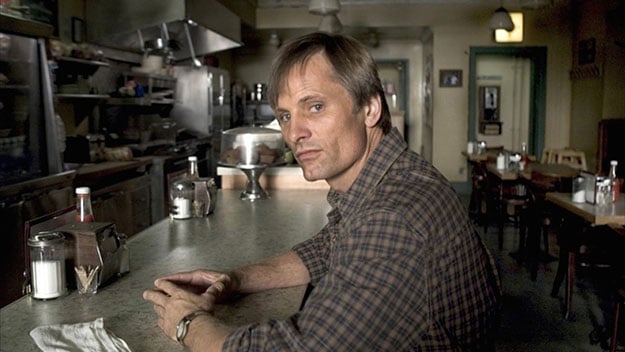
A History of Violence (#1)
“The great thing about this movie was the experience it invited. To watch the visceral violence unfold and listen to the audience cheer only to soon begin moaning and then go silent brought the theme of this movie to life in a way few films can ever achieve.” —Hans Morgenstern, Miami
“Radically re-envisioning elements of High Noon and Out of the Past, violence metastasizes outward from the initiating diner bloodbath, igniting the destructive impulses swimming just below placid surfaces, finally contacting the viewer through a classicist’s fusion of the visceral and the suggestive.” —Josef Braun, Toronto
“I would be shocked to learn that David Cronenberg hadn’t seen Dogville before filming Vince Locke and John Wagner’s graphic novel. Cronenberg’s vitriolic (although, remarkably, never cruel or unfair) portrait of small-town America corrupted by Urban Outsiders feels uncannily engaged in a sort of dialogue with Trier’s polarizing masterwork. The only answer I can come up with as to why History proved far less divisive is Cronenberg’s ingenious inside-out game plan. New Line even marketed it as a straight-ahead genre picture! (‘Brechtian Our Town’ pull-quotes just don’t sell as many tickets as ‘tense psychological thriller.’) This is one Trojan horse of a movie.” —Josh Timmermann
“The most overrated film of the year. Cronenberg, a director whose career has made fetish out of sadism, points a finger at small-town USA’s proclivity for violence. This is like George W. Bush lecturing the world about democracy.” —Jim Kernochan, New York
2046 (#2)
“Another masterpiece by the world’s greatest living filmmaker. A ravishing vortex of barely graspable memories, the many inflections of loneliness, urban ennui, visionary, almost-sci-fi, cruel romance, and visual spectacle.” —Jacob Hovind, Atlanta
“Vibrant cinematography, the mishmash of Japanese plus Mandarin plus Cantonese, surrealistic storyline, allusion to the eve of the end of China’s promise to leave Hong Kong alone… and Tony Leung.” —Vianne Orr, Vancouver, Canada
Good Night, And Good Luck. (#3)
“After Confessions of a Former TV Doctor, it seems nothing short of amazing that George Clooney, in a second stab at directing, has manage to produce a film so formally tight and assuredly unostentatious. Good Night, And Good Luck is everything that Clooney’s muddled debut wasn’t. Aside from a certain fascination with the dynamics of the television industry, they scarcely feel as if they were helmed by the same filmmaker.” —Josh Timmermann
Grizzly Man (#5)
“How could Hollywood ignore Herzog’s Grizzly Man for Oscar’s consideration? Clearly the Timothy Treadwell story is every bit Hollywood’s story as well. And maybe that’s the problem. Maybe Hollywood recognizes itself all too well, in the story of an all-American youth, innocent and misguided, seeking re-invention and redemption in the wilds of Alaskan grizzly country. For Hollywood, like Treadwell, is ego-driven to the point of isolation and just as out of touch. Maybe stories of actors gone crazy are a dime a dozen in Tinseltown.” —Odell Waller, Detroit
“I questioned its validity (as a documentary) throughout, yet it was the most emotionally authentic film I saw all year.” —Paul Iannone, Phoenix, AZ
“Death as a found object.” —Sarah Nichols, Bristol, CT
The New World (#10)
“Malick’s masterpiece has been, I think, misunderstood by both those attacking and exalting it. It is neither frivolous melodrama masquerading as art, nor is it a powerful reconstructing of myth. It is an annihilation of history and myth, proving that history and myth intertwine, and can almost never be separated. His discontinuous editing, his sensual cinematography, his ethereal voice-over narrations, and his use of classical music evoke the sense not of a reverie, but of a dream. History is little else, mythologized in the mind of the beholder, and can never be truly known. The New World juxtaposes historical accuracies and inaccuracies—in tandem with the aforementioned visual techniques—to exude the wondrous, dreamlike quality of discovery and establishment of history. The epic American filmmaking has been needing for many years.” —Evan Davis, Bronxville, NY
“Long live the anti-Spielberg! Please give me three hours!” —Roger Lonak, Chicago
Match Point (#8)
“How anyone could consider this to be anything other than a travesty is beyond me. Yes, it’s likely better than anything Woody has done since he last did this film, and yes, the tension of the climax is potent, but did anyone ever bother to look at the turgid script and lack of any sort of character development? Is the concept of luck worth considering when there’s no basis for choice? Or is everything in the world really as thinly conceived as Woody maintains? The whole film smacked of insincerity and a complex lack of grounding. Please, oy vey, and give me back the beat my heart skipped.” —Ivar Zeile, Denver
Land of the Dead
“As far as social commentary goes, this pathetic gorefest is about as clever as an episode of Diff’rent Strokes.” —Steve Lennart, Warrenville, IL
Munich (#9)
“This year, it was the ‘prestige’ Spielberg that outshined the ‘popcorn’ Spielberg (War of the Worlds). Not perfect by any stretch, but when it finds its grooves, this film really pops. Has Hollywood’s whiz kid finally grown up?” —Daniel Wible, West Chester, PA
The Squid and the Whale (#7)
“No other film comes to mind that so rawly, honestly, and devastatingly portray the effects of divorce. Often, I thought that Noah Baumbach was ripping off elements of my own life for his screenplay! Every character bleeds and causes bleeding, even Jeff Daniels’s tyrant, failed writer Bernard Berkman. Jesse Eisenberg and Owen Kline are like my brother and me, too precocious for our own good, and acting out the rage we don’t understand on our parents, and the world.” – Evan Davis
Tropical Malady (#29)
“Both unobtrusively heavy and deceptively light, the most inventive love story, or even plainly work of art, to come out of cinema in recent years. Weerasethakul once again proves to be a master of a kind of sensuous cinema, conveying the feeling of the sun on one’s skin, the sound of trees in the mid-afternoon, the sight of a friendly face from a moving bus.” —Jacob Hovind
War of the Worlds
“While North American leaders began to stumble due to different forms of arrogance, corruption, and idiocy, it wasn’t at all unexpected that the most prominent theme at the movies was that of the problematic patriarch. Throughout 2005 viewers were represented with masculine incompetence or indifference, often when dealing with family dynamics. It was fascinating reflection of our times to witness the difficulty fathers encountered while attempting to protect their offspring, occasionally being most responsible for the harmful circumstances that surrounded their children. Quite often paternal immaturity and awkwardness were center stage, as in Spielberg’s occupation allegory, War of the Worlds. Patriarchal deceit, deception, and delusion were the primary focus of both A History of Violence and Caché, as Cronenberg included an unsettling expression bestowed from father to son, while Haneke left us wondering what the kids would do next. From Noah Baumbach’s honest depiction of his pitifully insecure elitist father, to the charmingly catatonic Don Juan who was justly abandoned by his potential progeny in Jarmusch’s Broken Flowers, to the childish morality of first-time father Bruno in L’Enfant, to the foolish splendor of Richard Swersey’s hand set ablaze as a ceremonial conclusion to his dissolved marriage in Me And You. Last year’s cinematic landscape was littered with father figures who are inept and adrift.” —Chiranjit Goswami
The 40-Year-Old Virgin & Wedding Crashers
“News flash: Sex is comedy! And not in the talky and humorless, Catherine Breillat kind of way. These two are keepers, comedies that actually bring the funny. In spades. Check your guilt at the door.” —Daniel Wible
No Direction Home (#27)
“Further evincing television’s rising competition with the official film industry, the year’s best film debuted on PBS and was shortly followed by a DVD release. Martin Scorsese’s doc is nothing short of astonishing. Scorsese’s greatest film since Goodfellas not only has the ability to renew interest in Dylan, it can create it. The film is just as much about the Sixties as it is about Dylan. How could it be any other way?” —Lucas Stensland, Brooklyn, NY
The Beat That My Heart Skipped (#24)
“This proves Europeans are better at remaking American films better than vice versa!” —Tilly Gokbudak, Cloverdale, VA
Crash (#17)
“This movie wasn’t so much about an ensemble of characters as it was about the prejudices that fester in all of us. One of only a handful of movies that truly makes the audience feel like they are looking into the mirror that is the cinema screen.” —Hans Morgenstern
“A laughably contrived melodrama riddled with grandstanding performances and stereotyped characters marching around in clichéd scenarios. A wretched film that insults their intelligence of its viewers.” —Paul Iannone
The Intruder
“Denis’s film deals innovatively with tropes of borders: interior/exterior, spiritual/corporeal, the familiar/foreign. A metaphor for pregnancy and/or miscarriage can be applied to the issues explored. Louis is feminized by the impotency revealed by his over-determined action/violence that occurs only (seemingly) within his own mind. Considering the film’s larger trope of death and intrusion within one’s own body, a comparison is aptly allowed for that of a woman who has felt a child inside of her die. Louis’s dissociative violence and psychosis allows for a filmic way to utilize a male figure to incorporate singularly female experience.” —Jessica Felrice
Harry Potter and the Goblet of Fire
“The difference between a critic and an audience member is that criticism must retain its credibility, whereas an audience member can like a film for all the ‘wrong’ reasons and still feel glad of it. I loved the book so I loved the film, all right?” —Johnston Connelly, Palmerston, New Zealand
Alexander
“The director’s cut: Stone’s best! Flawed, but the future will avenge this work. Jolie does a great Polish accent.” —Roger Lonak
Syriana (#14)
“Why did so many people call this film complex? Are four interconnected storylines really that hard to follow?” —Steve Norwood
The Holy Girl (#25)
“Worst picture of the year: Not only was it a most contrived and immature use of visual setups, the way it evoked sexual paranoia in the audience at its screening at the 2004 NYFF was truly bizarre.” —Amos Perrine, Charleston, WV
Hustle & Flow
“A Rocky for the dirty South. Brewer, Terrence Howard, and hip-hop guardian angel Mannie Fresh managed to make a Hollywood movie without Hollywood. You might have seen this tale before, but rarely have the characters so earnestly compelled you to root for them.” —Stephen Brower, Santa Monica, CA
In My Country
“Boorman brings together two diametrically opposed ideologues in a generically contrived narrative that somehow addresses global concerns with depth and charisma. A poet and journalist together covering South Africa’s Truth and Reconciliation Committee hearings is bound to cause conflict. But seeing past difference is what the film successfully posits as the best way to avoid oppression. Boorman’s cinematography has become so subtle, graceful, and revealing that this film could be a helpful tutorial for many modern directors of mindless excess.” —Lucas Stensland
The Power of Nightmares
“Adam Curtis uses the medium as skillfully and imaginatively (and as entertainingly) as anyone, to posit breathtakingly provocative ideas that can haunt a viewer for months.” —Randall A. Byrn, New York
Me and You and Everyone We Know (#13)
“Now I know why people blame film for inspiring people to kill other people without reason or thought.” —Roger Lonak
Head-On (#21)
“One legitimately bipolar movie. The scene where Cahit and Sibel jump up and down exhorting that ‘punk is not dead!’ is the year’s most ecstatic movie moment.” —Josh Timmermann
Saraband (#28)
“The aging of the actors (two of the world’s finest) offscreen and the ease with which they re-embody their characters disarmingly merges reality with fiction, contributing movingly to the sense of time’s passage. Bergman emphasizes our inability to predict life’s sea changes or the (re)appearances of the people who change us. Yet rather than resign ourselves to inertia, he also urges us to honor that voice inside that compels us to fearlessly reach out.” —Josef Braun
Capote (#6)
“Of course Philip Seymour Hoffman gets due credit for grabbing the public’s interest. Still, all aspects of the movie—from the subtle score to the gloomy lighting and the tight editing, not to mention the quiet but pregnant interludes—call attention to the craftiness of underrated director Bennett Miller.” —Hans Morgenstern
Junebug (#23)
“Morrison’s folk art fish out of water tale gets the South, and more specifically, North Carolina, just right.” —Stephen Brower
Look at Me
“Agnès Jaoui again assembles an eccentric, neurotic, and often pretentious group of hopeless romantics. She’s the French Alan Rudolph. Look at Me is a colorful look at complicated Parisians who cannot help but judge people by their appearance. It’s not as simplistic as it sounds. Her film is so honest and perceptive that the monumental defiance in its climax is impossible to dismiss and wholly justifiable: it should give us all pause.” —Lucas Stensland
Tony Takitani
“Possibly one of the single most beautifully crafted, poetic, and haunting films of the year. This deceptively simple tale should be remembered as one of the decade’s finest works of cinematic art.” —Steve Norwood
The World
“The greatest statement in recent cinema of how we’re living in this world right now, with great sadness and small joys, in a small world with a miserably ironic epic scope.” —Jacob Hovind
Jarhead
“Sam Mendes’s film is either the most shamelessly cliché-ridden war movie ever made, or a deeply troublesome meditation on war movies and their cultural digestion. Sam Fuller famously contended that all war movies are, inadvertently, recruitment films. Jarhead is the best evidence yet.” —Josh Timmermann
Breakfast on Pluto
“Critics have condescendingly stated that the world of the film was too harsh for delicate Kitten. Again people are blinded by naive and boring prejudices. When Kitten stood up to terrorists in a farewell-to-arms scene, he did not arrive at this point because of a lack of courage or insight. Forget Batman, Kitten is 2005’s real action hero: the one of pacifism.” —Lucas Stensland
Constantine
“Didn’t you guys list this as one of the must-see movies? Why?” —Johnston Connelly
GENERAL COMMENTS
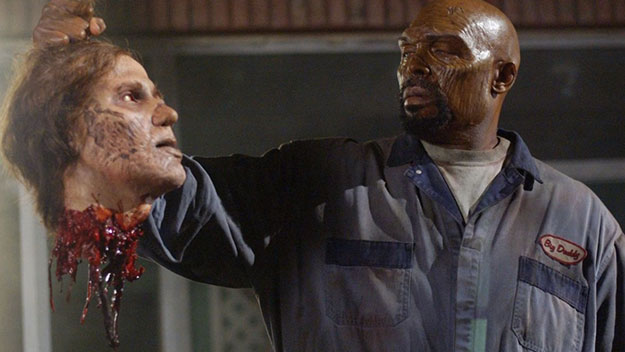
“That we Americans are reportedly losing interest in world cinema at this time in history is calamitous. Now especially is not the time to retreat further into our cultural bubble. Never has it been more crucial for us to comprehend that we share the globe—and fuckin’ revel in it.”—Redbeard Simmons
“2005 was the best year I can remember for movies. Most of the films that ranked #11-20 on my list would easily have made my top ten in 2004. How could anyone complain about a year that gave us strong work by Wong Kar Wai, Tim Burton, Werner Herzog, Todd Solondz, Nick Park, George Romero, Park Chan-wook, David Cronenberg, and Ingmar Bergman?” —Will Sloan, Toronto
“I can barely come up with ten 2005 movies that I moderately liked. So you’ll forgive me if there’s a decidedly underwhelmed feel to this list. This was not a fun year-end list to compile.” —Michael Pielocik
“We seem to be on the verge of something special. In fact, here’s my prediction: 2006 is the new 1966. Think about it.” —Eric Allen Hatch, Baltimore



